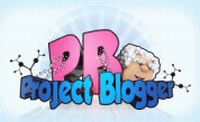A blog is a discussion or informational website published on the World Wide Web consisting of discrete, often informal diary-style text entries (posts). Posts are typically displayed in reverse chronological order, so that the most recent post appears first, at the top of the web page. Until 2009, blogs were usually the work of a single individual, occasionally of a small group, and often covered a single subject or topic. In the 2010s, "multi-author blogs" (MABs) emerged, featuring the writing of multiple authors and sometimes professionally edited. MABs from newspapers, other media outlets, universities, think tanks, advocacy groups, and similar institutions account for an increasing quantity of blog traffic. The rise of Twitter and other "microblogging" systems helps integrate MABs and single-author blogs into the news media. Blog can also be used as a verb, meaning to maintain or add content to a blog.
Blogger is an American online content management system (CMS) which enables multi-user blogs with time-stamped entries. Pyra Labs developed it before being acquired by Google in 2003. Google hosts the blogs, which can be accessed through a subdomain of blogspot.com. Blogs can also be accessed from a user-owned custom domain by using DNS facilities to direct a domain to Google's servers. A user can have up to 100 blogs or websites per account.
A trackback allows one website to notify another about an update. It is one of four types of linkback methods for website authors to request notification when somebody links to one of their documents. This enables authors to keep track of who is linking to their articles. Some weblog software, such as SilverStripe, WordPress, Drupal, and Movable Type, supports automatic pingbacks where all the links in a published article can be pinged when the article is published. The term is used colloquially for any kind of linkback.
Following a crackdown on Iranian media beginning in 2000 many Iranians turned to weblogging to provide and find political news. The first Persian language blog is thought to have been created by Hossein Derakhshan,, in 2001. Derakhshan also provided readers with a simple instruction manual in Persian on how to start a blog. In 2004, a census of blogs around the world by the NITLE found 64,000 Persian language blogs. In that year the Islamic government also began to arrest and charge bloggers as political dissidents and by 2005 dozens of bloggers had been arrested.
Forfás was the national policy advisory board for enterprise, trade, science, technology and innovation in Ireland. The agency was established in January 1994 under the Industrial Development Act, 1993 and was run by a board appointed by the Minister for Enterprise, Trade and Employment, to whom the agency was responsible. Forfás was dissolved on 1 August 2014 and its functions were transferred to the Department of Enterprise, Trade and Employment, Enterprise Ireland, the Industrial Development Authority and the Health and Safety Authority.

Science Foundation Ireland (SFI) is the statutory body in the Republic of Ireland with responsibility for funding oriented basic and applied research in the areas of science, technology, engineering and mathematics (STEM) with a strategic focus. The agency was established in 2003 under the Industrial Development Act 2003 and is run by a board appointed by the Minister for Further and Higher Education, Research, Innovation and Science. SFI is an agency of the Department of Further and Higher Education, Research, Innovation and Science.
This is a ' list of blogging terms. Blogging, like any hobby, has developed something of a specialized vocabulary. The following is an attempt to explain a few of the more common phrases and words, including etymologies when not obvious.
An edublog is a blog created for educational purposes. Edublogs archive and support student and teacher learning by facilitating reflection, questioning by self and others, collaboration and by providing contexts for engaging in higher-order thinking. Edublogs proliferated when blogging architecture became more simplified and teachers perceived the instructional potential of blogs as an online resource. The use of blogs has become popular in education institutions including public schools and colleges. Blogs can be useful tools for sharing information and tips among co-workers, providing information for students, or keeping in contact with parents. Common examples include blogs written by or for teachers, blogs maintained for the purpose of classroom instruction, or blogs written about educational policy. Educators who blog are sometimes called edubloggers.
Mobile blogging is a method of publishing to a website or blog from a mobile phone or other handheld device. A moblog helps habitual bloggers to post write-ups directly from their phones even when on the move. Mobile blogging has been made possible by technological convergence, as bloggers have been able to write, record and upload different media all from a single, mobile device. At the height of its growth in 2006, mobile blogging experienced 70,000 blog creations a day and 29,100 blog posts an hour. Between 2006 and 2010, blogging among teens declined from 28% to 14%, while blogging among adults over 30 increased from 7% to 11%. However, the growing number of multi-platform blogging apps has increased mobile blogging popularity in recent years creating a brand new market that many celebrities, regular bloggers and specialists are utilizing to widen their social reach.

Discover Primary Science is a flagship project of the Irish Government’s Discover Science & Engineering (DSE) awareness programme.
While the term "blog" was not coined until the late 1990s, the history of blogging starts with several digital precursors to it. Before "blogging" became popular, digital communities took many forms, including Usenet, commercial online services such as GEnie, BiX and the early CompuServe, e-mail lists and Bulletin Board Systems (BBS). In the 1990s, Internet forum software, such as WebEx, created running conversations with "threads". Threads are topical connections between messages on a metaphorical "corkboard". Some have likened blogging to the Mass-Observation project of the mid-20th century.

Paul Zachary Myers is an American biologist who founded and writes the Pharyngula science-blog. He is associate-professor of biology at the University of Minnesota Morris (UMM) where he works in the field of developmental biology. He is a critic of intelligent design (ID), the creationist movement, and other pseudoscientific concepts.

Discover Science & Engineering (DSE) is an Irish Government initiative that aims to increase interest in science, technology, engineering and mathematics (STEM) among students, teachers and members of the public in Ireland.
The Science.ie portal provides all sorts of information about careers in science, technology, engineering and mathematics (STEM).
Greenwave is a mass science experiment involving primary schools across Ireland. It examines and records how spring arrives in Ireland. This is an educational and science initiative of the Irish Government’s Discover Science & Engineering (DSE) awareness programme.
The My Science Career website is an Irish online resource for career information in science, technology, engineering and mathematics (STEM).
Indian blogosphere is the online predominantly community of Indian weblogs that is part of the larger blogosphere.
Reblogging is the mechanism in blogging which allows users to repost the content of another user's post with an indication that the source of the post is another user.
An anonymous blog is a blog without any acknowledged author or contributor. Anonymous bloggers may achieve anonymity through the simple use of a pseudonym, or through more sophisticated techniques such as layered encryption routing, manipulation of post dates, or posting only from publicly accessible computers. Motivations for posting anonymously include a desire for privacy or fear of retribution by an employer, a government, or another group.
St. Aloysius College was a secondary school in Athlone, Westmeath, Ireland. It was primarily a school for boys, though its Leaving Certificate Repeat Programme was open to all students.




